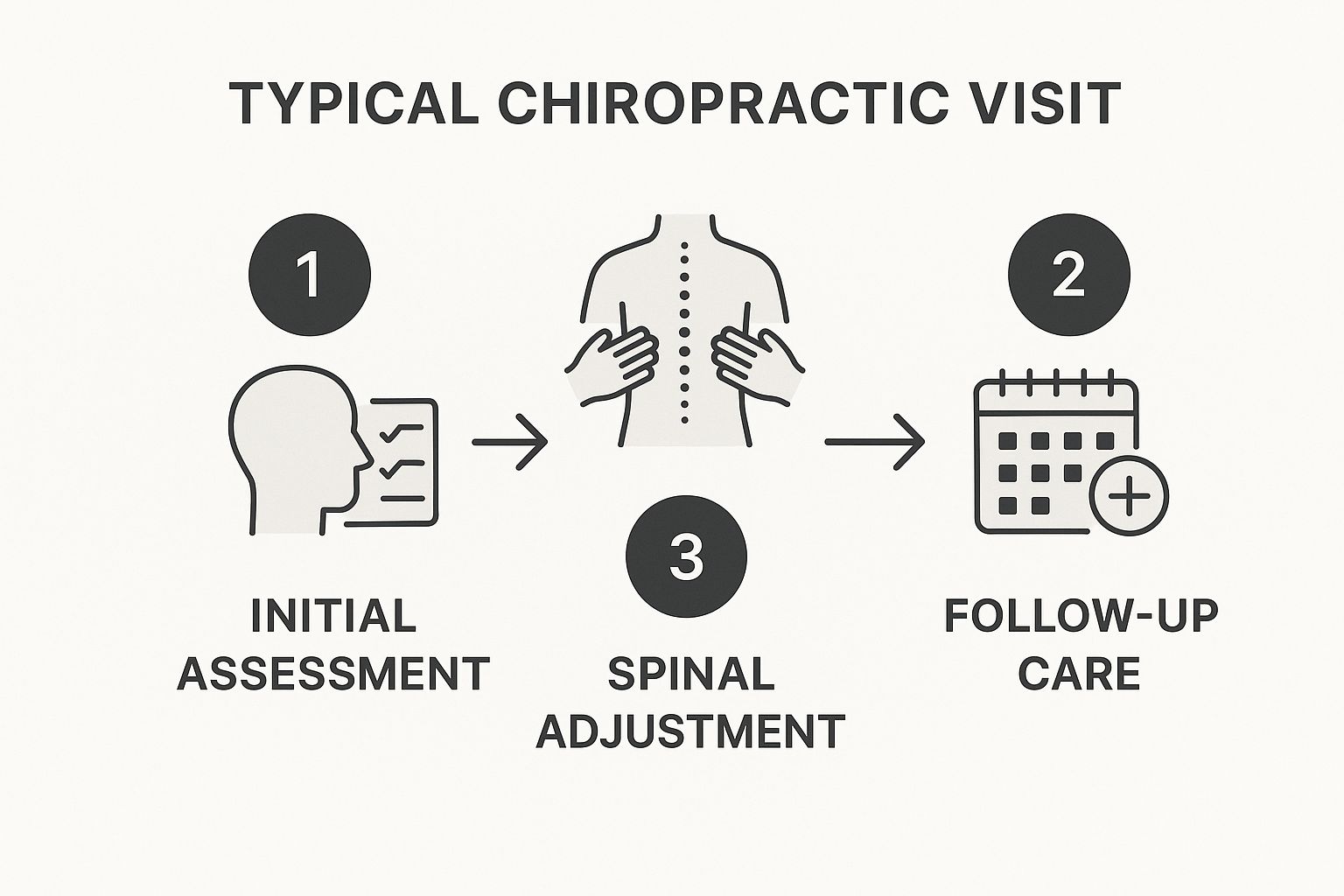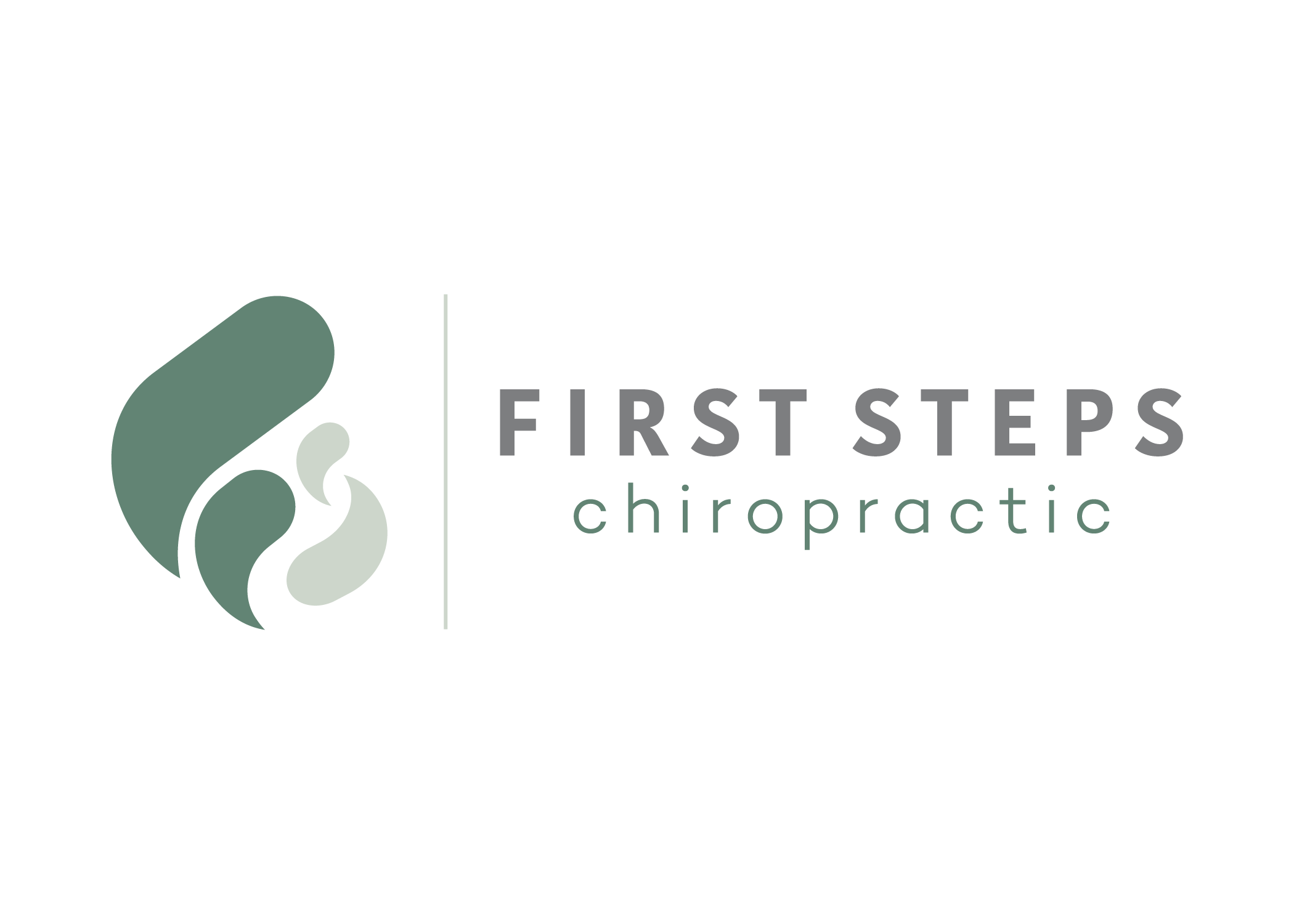When you find yourself searching for a "family chiropractor near me," you’re probably looking for more than just a quick fix for back pain. You're looking for a single, trusted partner for your family's entire wellness journey. Having one expert who can provide consistent, specialized care for everyone—from your newborn to your spouse—simplifies life in a big way.
Why Whole-Family Chiropractic Care Is Gaining Trust

It’s clear that chiropractic care has moved beyond being a niche treatment and is now a core wellness strategy for many modern families. What’s driving this shift? It's a growing desire for proactive, non-invasive health solutions that can help everyone under one roof. Instead of juggling appointments with multiple specialists, families are choosing to build a lasting relationship with one practice that genuinely understands their history and health goals.
This integrated approach just makes sense. A practice that focuses on the whole family is equipped to handle a wide range of needs, such as:
- Infant and Newborn Care: Gently addressing misalignments that can happen during birth.
- Childhood Development: Supporting healthy posture and nervous system function as they grow.
- Teenage Athletes: Helping with sports injuries and boosting performance.
- Prenatal Support: Keeping expectant mothers comfortable and ensuring proper pelvic alignment.
- Adult Wellness: Managing chronic pain, daily stress, and other musculoskeletal issues.
A Focus On Proactive Wellness
The real magic of family chiropractic care is in its proactive approach. It's about getting ahead of health issues instead of just reacting to them. Your family chiropractor becomes a central part of keeping everyone healthy, whether it's correcting your child's "text neck" or helping you recover from a weekend warrior injury. This kind of consistency builds a deep level of trust and familiarity that’s tough to find anywhere else.
The market certainly reflects this growing confidence. The U.S. chiropractic industry is expanding as more people seek out drug-free, non-invasive treatments.
The real value is having one professional who understands the interconnected health of your family. When a chiropractor knows a parent's history with scoliosis, they are better equipped to screen their children for early signs.
This continuity of care is simply invaluable. To see this in action, it's worth exploring how clinics achieve excellence in pediatric chiropractic care. When you choose a provider who specializes in family wellness, you're ensuring that every member of your family gets the attentive, appropriate care they deserve.
Quick Guide to Choosing a Family Chiropractor
To simplify things, here's a snapshot of the key factors to consider when you search for a family chiropractor.
| Factor | What to Look For |
|---|---|
| Specialization | Look for specific certifications or training in pediatric and prenatal care. |
| Experience | How long have they been treating families? Do they have experience with your specific concerns? |
| Techniques | Do they use gentle, age-appropriate adjustment methods like the Torque Release Technique? |
| Office Atmosphere | Is the clinic welcoming for children? Does the team make your family feel comfortable? |
| Reviews & Referrals | What do other local families say? Check online reviews and ask for recommendations. |
Taking a moment to check these boxes will help you find a practice that's not just a provider, but a true partner in your family's long-term health.
Starting Your Search for a Local Chiropractor

Finding the right chiropractor for your family starts with building a solid list of potential clinics. A quick "family chiropractor near me" search is a decent first step, but the most trusted recommendations almost always come from your personal network. I always tell parents to start there.
Your family doctor or pediatrician is an excellent person to ask. They usually have a network of specialists they know and trust, and they can point you toward a chiropractor whose methods align with conventional medical care. Don't forget about other parents, either—they're a goldmine for firsthand accounts and real-world experiences.
Tapping Into Trusted Directories
Once you have a few names from people you trust, it's time to dig a little deeper. Your health insurance provider’s directory is a great place to start. This simple check confirms who is in-network and meets the insurer’s credentialing standards, which can save you from unexpected costs later on.
Reputable online health portals can also be incredibly helpful. Look for sites that offer detailed profiles covering a chiropractor’s education, specialties, and, most importantly, patient reviews.
The goal here isn't just to find the closest clinic. You're trying to create a hand-picked list of well-regarded professionals you can look into further. A strong initial list makes all the next steps so much easier.
Remember, a great chiropractor does more than just address symptoms; they focus on finding the root cause. As you build your list, look for practitioners who emphasize a thorough diagnostic process. This commitment is often what sets the best apart. For more guidance on this, check out our post on 3 things to look for in a chiropractor near you.
How to Search More Effectively
When you're back to using search engines or health directories, get specific with your search terms. A generic query will give you generic results. Instead, try using phrases that reflect your family's unique needs.
Think along these lines:
- "Pediatric chiropractor for infants"
- "Webster certified prenatal chiropractor"
- "Chiropractor specializing in ADHD"
Using targeted keywords like these helps cut through the noise. It lets you zero in on practitioners who have the exact expertise your family needs, ensuring the names on your list are genuinely equipped to provide the right kind of specialized care.
Alright, you've got your shortlist of local chiropractors. Now comes the real work: digging into their credentials to see who's truly equipped to care for your entire family.
It's a crucial step because not all chiropractors are the same, especially when you need someone who can safely and effectively treat everyone from your newborn to your teenager, and of course, you and your partner. Searching for a "family chiropractor near me" means you're looking for a very specific, specialized skill set.

While every chiropractor has a solid foundation from their general training, family wellness is a whole different ballgame. It requires advanced skills and a deep understanding of the body at every stage of life. The best practitioners are those who have invested in significant postgraduate education to master care for these different life stages.
Key Family-Focused Certifications
When you're scanning a chiropractor's website, certain credentials should jump out at you. These aren't just fancy acronyms—they represent hundreds of hours of focused study and a genuine commitment to the unique needs of children and pregnant women.
Here are two of the most important certifications to keep an eye out for:
- DACCP or CACCP: The Diplomate in Clinical Chiropractic Pediatrics (DACCP) and the Certified by the Academy Council of Chiropractic Pediatrics (CACCP) are the gold standards. They signal extensive, top-tier training in pediatric care.
- Webster Technique Certified: This is a must-have for any chiropractor working with expecting mothers. The Webster Technique is specifically designed to restore proper pelvic balance and function, which can contribute to a more comfortable pregnancy and a smoother birth.
A chiropractor holding these qualifications understands how to adapt their techniques for a developing spine versus a fully grown one. If you'd like to learn more about the specifics, our guide explains why pediatric chiropractic care is beneficial for children.
Asking the Right Questions
Seeing credentials on a website is one thing. Understanding how a chiropractor applies that knowledge in the real world is another. This is where your consultation or first phone call becomes so important. Don't be shy—ask direct questions to get a feel for their hands-on experience.
Instead of just asking, "Do you treat kids?" try getting more specific. Ask something like: "What's your approach to adjusting a newborn dealing with colic versus a teenager with a sports injury?"
A confident, detailed answer will tell you everything you need to know. It reveals their depth of understanding and confirms they use gentle, age-appropriate techniques, not a one-size-fits-all approach.
This distinction matters more than ever. Chiropractic is seeing huge growth in pediatric care as more parents and pediatricians recognize its value. While adults are still the largest patient group, the pediatric segment is expanding quickly. Choosing a practitioner who is already a leader in this evolution ensures your family gets modern, informed, and truly specialized care.
What to Expect at Your First Consultation
Think of your first visit with a potential family chiropractor as a two-way interview. It’s not just a check-up. This is your chance to really get a feel for their approach and philosophy, and it's their opportunity to understand your family's unique health story and what you're hoping to achieve.
Knowing what's coming can help you walk in feeling confident and prepared to make the right choice for your family.
The appointment almost always kicks off with a detailed health history. Be ready to talk about more than just the main issue that brought you in. A great family chiropractor will want the whole story—past injuries, lifestyle habits, and health concerns for every family member who will be getting care. They are looking to connect the dots, often finding links you might not have considered.
The In-Depth Physical Exam
After digging into your health history, the chiropractor will move on to a thorough physical examination. This is where their hands-on skill truly comes into play. It’s so much more than just prodding a sore spot; it’s a detailed assessment of your body's mechanics and how well your nervous system is functioning.
This hands-on exam usually covers several key areas:
- Postural Screenings: The doctor will look at your posture from different angles. They’re searching for any imbalances that might be putting stress on your spine and nervous system.
- Range-of-Motion Tests: You'll be asked to gently move your neck, back, and limbs. This helps the chiro pinpoint any joints that are restricted or causing discomfort.
- Palpation: This is the technical term for using their hands to feel your spine and the muscles around it. They are checking for tenderness, swelling, or tiny misalignments (subluxations).
- Neurological and Orthopedic Tests: Depending on what you came in for, they might run some simple reflex tests or other checks to evaluate your nerve function and joint stability.
This visual gives you a good idea of the chiropractic journey, which always starts with this critical first assessment.

As you can see, everything flows from that initial, detailed evaluation. It's the foundation that informs the specific adjustments and ongoing care your family might need.
Key Questions to Have in Your Back Pocket
This first meeting is your best opportunity to ask the tough questions. A transparent, patient-first chiropractor will be happy to answer them.
Come prepared with a list. Your goal is to leave with a clear understanding of their practice philosophy, what a potential care plan would look like, and a complete breakdown of costs. There should be no surprises.
Make sure you ask about the specific techniques they use, especially how their approach for kids differs from adults. Ask about the expected frequency and length of care and, importantly, how they track progress.
Finally, get total clarity on insurance and any out-of-pocket costs. When a chiropractor answers these questions with confidence and detail, it’s a fantastic sign you’ve found a wellness partner you can trust.
Making Your Final Decision with Confidence
You’ve done your homework. You've checked the reviews, verified the credentials, and even had that first sit-down meeting. Now comes the part where you pull all those pieces together to choose a long-term wellness partner for your family. This final step is less about what’s on paper and much more about the gut feeling you get when you're there.
The moment you step into the clinic, just take a breath and look around. Does it feel calm and organized? A family-focused practice should feel welcoming and especially child-friendly. You want to see staff who are patient and genuinely happy to help. A positive, low-stress environment can make all the difference in your family’s entire experience with chiropractic care.
Evaluating Communication and Logistics
Think back to your consultation and pay close attention to the chiropractor’s communication style. Did they actually listen to your concerns without making you feel rushed? A truly great family chiropractor takes the time to walk you through their findings and explain their proposed care plan in a way that makes sense. You should feel empowered to be an active part of your family's health journey.
Your final choice should feel like a partnership. You need a provider who not only has the right clinical skills but also communicates with clarity and empathy, making you feel heard and respected every step of the way.
Finally, don’t forget the practical stuff that makes regular visits possible instead of a headache. Before you commit, it’s smart to double-check these crucial details:
- Office Hours: Do their hours actually work with your family’s school and work schedules?
- Appointment Availability: How easy is it to book a visit, particularly if an urgent issue pops up?
- Insurance and Billing: Get a clear picture of how they handle insurance claims and what your out-of-pocket costs will look like.
Taking the time to evaluate these points means no unpleasant surprises later on. It’s this kind of thoroughness that has helped strengthen the reputation of chiropractic care, with the industry's revenue projected to hit $22.2 billion by 2025 as more healthcare providers recommend it. You can find more insights about this growing collaboration on IBISWorld.
By weighing these personal and practical factors, you can move forward with confidence and select the best "family chiropractor near me" for your unique needs.
Common Questions About Family Chiropractic Care
Even after you’ve decided to look for a "family chiropractor near me," it’s totally normal to have a few more questions pop up. Getting those questions answered is the key to feeling confident and comfortable with the doctor you ultimately choose. Let's walk through some of the most common things families ask.
One of the biggest concerns for parents, and rightly so, is safety—especially when it comes to their littlest ones. This naturally leads to questions about what adjustments actually look like for babies and kids.
Is Chiropractic Care Safe for Children and Infants?
Yes, absolutely. The key is that it must be performed by a chiropractor who has specialized training in pediatrics. It's important to forget the image of forceful "cracking" you might associate with adult adjustments. That’s not what we do with kids.
Pediatric adjustments are incredibly gentle and precise.
A practitioner with advanced certifications, like a DACCP, uses specific, modified techniques that are perfectly suited for a child's delicate and developing spine. The amount of pressure used is often no more than what you'd use to check if a tomato is ripe. This ensures the experience is not only safe but also comfortable and effective.
The core principle here is that the technique must always match the patient. A gentle, specific adjustment for an infant is designed to address things like birth-related strain, while a teenager’s sports injury requires a completely different approach. This adaptability is the hallmark of a true family chiropractor.
How Often Will My Family Need Adjustments?
This is a great and very important question, but the honest answer is: it depends. There's no one-size-fits-all schedule because the frequency of care is entirely personalized. It's all based on each family member's specific condition and their overall health goals.
For instance, someone dealing with an acute injury might need a series of visits scheduled closely together at first to stabilize the issue and promote healing. On the other hand, a family focused on proactive wellness care might just come in once a month or even every few months for a tune-up.
A good chiropractor will design a unique care plan for each person. They will clearly explain the goals and milestones for every phase of care, so you always know what to expect.
At First Steps Chiropractic, we believe in empowering families with knowledge and truly personalized care. If you have more questions or you're ready to see how neurologically-focused chiropractic can support your family's well-being, we invite you to schedule a complimentary consultation. We’d love to meet you and your family.

